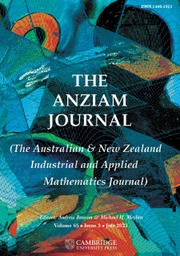Crossref Citations
This article has been cited by the following publications. This list is generated based on data provided by Crossref.
Solekhudin, Imam
and
Sumardi
2017.
A DRBEM for steady infiltration from periodic semi-circular channels with two different types of roots distribution.
Vol. 1848,
Issue. ,
p.
040009.
Inayah, Nur
Manaqib, Muhammad
and
Majid, Wahid Nugraha
2021.
Furrow irrigation infiltration in various soil types using dual reciprocity boundary element method.
Vol. 2329,
Issue. ,
p.
040011.
Bilaku, A
Lobo, M
and
Kleden, M A
2021.
Application of boundary element method on 2-D laplace equation and its error analysis.
Journal of Physics: Conference Series,
Vol. 2017,
Issue. 1,
p.
012008.

